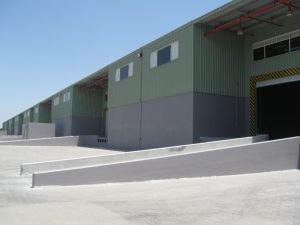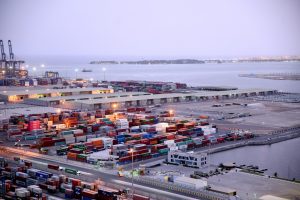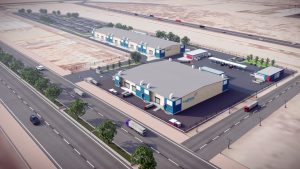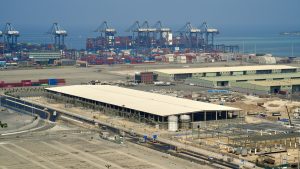The Kingdom of Saudi Arabia has set out on the path to rapid transformation in its pursuit to diversify away from an economy which is over-dependent on oil. Driven by the ambitious ‘Saudi Arabia Vision 2030’ and powered in large part by lucrative revenues from high oil prices, the Kingdom has announced a series of mega-projects, development plans and initiatives, which are unparalleled in scale and unprecedented in what they aim to achieve and deliver.
As recently as October, 2022, His Royal Highness Prince Mohammed bin Salman bin Abdulaziz, Crown Prince, Prime Minister and Chairman of the Council for Economic and Development Affairs, announced the launch of the Global Supply Chain Resilience Initiative (GSCRI). Under the GSCRI, ‘SAR 10 Billion (USD 2.7 Billion) has been earmarked to support several initiatives, including financial and non-financial support for global investors interested in incorporating Saudi Arabia in their supply chains. The initiative will support growth in key sectors and is expected to attract investments of SAR 40 Billion (USD 10.7bn) within the first two years of being launched.
The GSCRI is welcome news for the Kingdom’s premier Logistics Real Estate Company LogiPoint, which is making its own investments and launching its own initiatives in the Logistics and Supply Chain sector to facilitate trade and attract investments from local as well as international businesses. As the Kingdom’s leading developer of logistics parks and economic zones and the pioneering organization which successfully launched and developed the Kingdom’s first and the largest Bonded and Re-Export Zone over 20 years ago, the company realizes only too well the far reaching impact a resilience-centric initiative like GSCRI can have in the global logistics ecosystem.
Need for Resilience:
First, there was the COVID-19 pandemic; then, there was the Russian invasion of Ukraine; each setting into motion series of events across the globe which snowballed into unprecedented disruptions for the modern business world in general and for the supply chain industry in particular. All along, there was the usual fare of political upheavals, natural disasters, economic uncertainties, technical glitches, system failures, human errors, and so much more that keeps the job of Supply Chain professionals interesting by throwing up new challenges every day.
For the latter group of agents of chaos, the supply chain and logistics industry has evolved practices and processes as well as tools and frameworks, which mitigate, if not altogether eliminate, the effects of disruptions supply chain professionals must grapple with every day. However, when a Black Swan event like a global pandemic throws the proverbial spanner in the works, or when the world’s food and energy supplies are disrupted by an international conflict like the Russia-Ukraine war, conventional supply chains are stretched to breaking point, and sometimes beyond the breaking point.
Black Swan events aside, the dynamics of changing demographics, consumer behavior shifts, disruptive technologies and competition pose constant challenges to conventional models of supply chain management. Pre-pandemic research by the McKinsey Global Institute found that, on ave rage, companies experience a disruption of one to two months in duration every 3.7 years. The fallout of these disruptions is costly both in terms of outlays as well as lost opportunities and so part of the mandate of logistics leadership has always been to design and build supply chains which have the resilience to mitigate and withstand disruptions, the elasticity to adapt and the agility to respond quickly to the changing demand scenarios.
Today, more than ever before, ‘Resilience, Elasticity and Agility’ have taken center stage in the Supply Chain discourse in the boardrooms. Many businesses have learnt the hard way not to treat supply chain resilience as a necessary cost but an investment in competitive advantage. It is in this background that the Kingdom of Saudi Arabia has launched The Global Supply Chain Resilience Initiative (GSCRI).
LogiPoint – An Introduction.
LogiPoint is the Kingdom’s leading Logistics Real Estate Company developing economic zones and logistics parks across the Kingdom. These economic zones and logistics parks provide specialized infrastructure to the supply chain and logistics industry, which delivers operational excellence, efficiency and agility in times of smooth sailing, while enabling contingency planning for resilient supply chain strategy during disruptions.
Farooq Shaikh, CEO LogiPoint, says: “Building an infrastructure to compete in a fiercely competitive world requires substantial and continuous investments into innovative technologies, infrastructure development, value creation, and business development. LogiPoint investments in these areas have traditionally had a multiplier effect on the economy, because we provide proof of concept to global blue-chip companies looking to leverage the Saudi Arabian market and its strategic location. In this way, we help draw valuable and substantial investments into the Kingdom.”
Jeddah Logistics Hub in Modon 1, Jeddah and the 314,000 Sqm Logistics Park, South Jeddah in Khomrah are two examples of such investments, which will help create thousands of jobs directly and indirectly. There are exciting new projects in the pipeline, which will see LogiPoint expand its footprint across the Kingdom through strategically located new Logistics Parks and Economic Zones.
LogiPoint began its journey in 1999 as the Kingdom’s first and the largest Bonded and Re-Export Zone (BRZ). The BRZ has since gone from strength to strength over the years as it has grown into a multi-award winning logistics hub located inside Jeddah Islamic Port serving a wide spectrum of local and international clients. In many ways, the company crystallizes the Kingdom’s ambition under Vision 2030 to transform into a global logistics hub.
Farooq Shaikh agrees: “With Saudi Arabia’s Vision 2030, we have seen a culture of collaboration evolve across the stakeholders as we work collectively towards the stated common goal of becoming a global logistics hub and we believe in this way the Vision 2030 is playing a pivotal role in helping expedite this transformation. For LogiPoint, it is a matter of privilege and pride that we find ourselves aligned naturally and historically with the Vision 2030.”
The Bonded and Re-Export Zone (BRZ)
The BRZ is One Million Square Meters of transformative bonded logistics space located inside the Jeddah Islamic Port. It boasts state-of-the-art logistics infrastructure, including Pre-Built and Built-to-Suit facilities, Container Yards, Reefer Zone, and multi-purpose Open Yards. Additionally, a dedicated customs office for BRZ clients expedites the customs clearing procedure and allows clients to achieve a considerably faster turn-around time than average clearance.
Most significantly, the infrastructure is backed by a team of highly qualified logistics specialists who collaborate with regulatory bodies to create and execute user-friendly, industry-specific processes that simplify the whole supply chain for efficiency and agility. These benefits help build resilience into the clients’ supply chains by providing them with cost-effective and agile contingency options in case of disruptions and the ability to scale quickly with demand fluctuations.
Strategic BRZ clients have also been provided fenced out non-bonded space on the BRZ premises, since it helps them reduce lead times and achieve faster delivery to client premises because of the central location of the BRZ. BRZ clients are spread across all the major market segments including 3PLs, Couriers and Express Delivery, e-Commerce, FMCG, Automobiles, Metals, Minerals and Commodities, Pharmaceuticals, Retail, and Projects. Some of the Logistics Solutions rolled out in BRZ over the last couple of years are as follows:
Export Distribution Hub: Petrochemicals are the Kingdom’s greatest export, with hundreds of thousands of containers shipped annually to destinations worldwide. LogiPoint collaborated diligently with Saudi Aramco, SABIC, and other high-volume exporters to re-engineer the whole export process and bring customers closer to their markets by shortening the lead time between order and delivery. In this high-volume, high-stakes business, logistical efficiency lends vital competitive advantage to KSA exporters.
Cross-border Gulf: Shipments originating in Europe and the Americas, and passing through the Red Sea, typically have a transit time of 8-12 days ahead of them to reach the GCC ports in the Arabian Gulf. LogiPoint introduced the Cross-border Gulf service under which shipments can be discharged in Jeddah and moved to ports and final destinations in the GCC countries via bonded trucking. This helps reduce the transit times by 7-10 days and translates to greater efficiency as well as higher revenues and profitability for the clients.
Sea/Air and Air/Sea: LogiPoint have been working extensively with the industry stakeholders and the regulatory bodies to design and streamline multimodal movement of shipments seamlessly. Thanks to the initiatives taken by LogiPoint, Sea-Air and Air-Sea multi-modal shipments have become a reality in KSA. This is an important development in putting the KSA on the world logistics map as a strategically located multimodal logistics hub.
Bonded Express Facility: Lightning-fast e-commerce relies extensively on efficient, error-free and high-speed logistics for survival and success. LogiPoint launched the Bonded Express Facility to serve the e-commerce market. This facility, the first of its type in a Saudi port, is dedicated to the clearance and fulfilment of express and e-commerce shipments. Ground-breaking contracts with global e-commerce giants Amazon and with regional and national industry leaders such as Aramex and Naqel highlight the relevance and success of this facility.
Value Added Services: LogiPoint has been offering a wide array of Value-Added Services (VAS) over the years. These include short-term storage, packing, co-packing, labelling, bundling and distributing goods, duty deferment (important especially when VAT has become such an important part of the cost for a supply chain), and clearance and delivery support. In addition, the Reefer Village boasts a Reefer Container Yard with 240 plug-in points, Reefer cross-stuffing stations, and an ever-expanding fleet of trucks and gensets.
Jeddah Logistics Park (JLP)
Jeddah Logistics Park is the latest addition to the LogiPoint portfolio. It is being developed on a 314,000 SQM parcel of land located in Khumrah, south of Jeddah, around 20 KMs away from the bustling and busy port of Jeddah.
JLP will be a multi-purpose logistics space, which will boast state-of-the-art warehousing facilities including both pre-built and Built-to-Suit facilities. Additionally, there will be opportunities for light industrial units to set up manufacturing units by capitalizing on the Kingdom’s strengths in affordable, skilled and well-trained labor, uninterrupted power supply, government support through initiatives such as GSCRI, and lastly global reach and connectivity to gain a competitive edge over their competition.
Since JLP is planned as a self-contained eco-system, it will also include a sector for staff accommodation and plenty of retail space to cater to the day-to-day needs of the residents. JLP’s world-class, sustainable infrastructure will be built to LogiPoint’s highest standards and will be powered by reusable resources, while reliable, high-speed connectivity will be ensured via scalable and customizable ICT infrastructure. LogiPoint’s commitment to complying with ESG protocols also means that there will be built-in systems to ensure waste reduction, water conservation and sustainable recycling.
The JLP clients will be able to integrate resilience into their supply chains because of the LogiPoint Real Estate infrastructure and the proximity to the Jeddah port. In addition, the clients will be able to incorporate cutting-edge technical solutions into their processes, allowing them to achieve more agility and flexibility in their operations while adhering to ESG norms for sustainability.
Jeddah Logistics Hub
Jeddah Logistics Hub is a BOT (build, operate & transfer) project in partnership with the Saudi Industrial Cities Authority (Modon) in line with objectives of the Saudi Vision 2030 and the National Industrial Development and Logistics Program (NIDLP). It is a 120,000 sqm, fully integrated logistics platform enabling Modon 1 users to optimise and streamline their logistics operations while adhering to sustainability goals.
Jeddah Industrial City is home to over 1,000 factories and is the beating heart of Jeddah’s manufacturing economy. Heavy congestion in the bustling area led to costly delays, pollution, stress and strife on an ongoing basis. Phase 1-JLP addressed the problem by building a dedicated truck parking zone with 380 parking spaces supported by ancillary services like repair workshops, and facilities for drivers like rest areas, prayer areas and other utilities.
Phase 2 saw the commissioning of the first Built-to-Suit facility to be built outside the BRZ. LogiPoint started work on building a dedicated, first-of-its-kind facility for United Warehouse Company in JLH. The multi-purpose facility will have specialized temperature-controlled zones to handle frozen, chilled, ambient and dry cargoes and is being built over a 15,000 sqm area which includes a 12,000 covered warehousing space. The ground-breaking ceremony took place on November 29, 2022 and was attended by dignitaries from Modon, UWC and LogiPoint.
Sustainable Warehousing – Pre-built and Built-to-Suit (BTS)
LogiPoint operates primarily as a Logistics Real Estate company designing, building, delivering and managing elements of Logistics infrastructure like warehouses, container yards, reefer yards, and open storage yards. Warehouses are the most investment intensive and the most complex of these structures – not to mention the most rapidly evolving in design, structure, construction and utilization. LogiPoint offers warehousing solutions in two ways:
Pre-Built Standard Warehousing, where LogiPoint draws on customer feedback and own past experience, while also anticipating the changing needs of the general warehousing clientele to design and construct Warehousing Villages which have multiple, often identical, units available for short to medium term lease. These units range in size from 500 SQM each in the earliest Warehouse Villages to 2000 SQM each in Warehouse Village 5, the latest and state-of-the-art facility about to be delivered in a few weeks. These facilities are designed as multi-purpose, multi-client facilities and cater to clients whose requirements can be met with standard sized warehouses.
Built-to-Suit (BTS) Warehousing, where LogiPoint builds a tailor-made facility for the client according to the specifications provided by the client. Usually, such facilities are built for a single client under a long-term partnership agreement, where LogiPoint brings the design and the construction expertise as well as world-class LogiPoint standards to the project, while the client designs the facility in line with their operational requirements. LogiPoint have won accolades for building state-of-the-art BTS facilities, which maintain strict compliance to ESG protocols and global safety standards, and for delivering reliable high quality buildings on schedule.
The Captain Speaks:
Speaking about the LogiPoint Warehousing Solutions in the pipeline, Farooq Shaikh says, “These are exciting times for LogiPoint. On the one hand, we are delivering our Warehouse Village 5 this year, which will reset the bar for state-of-the-art multipurpose warehousing solutions inside the Jeddah Islamic Port, especially with its dedicated Pharmaceuticals section – a first in the Kingdom and a vitally important addition in a post-pandemic world. We will also be delivering our Built-to-Suit facilities to two of our blue chip clients this year, while discussions for an another two Built-to-Suit facilities with a global 3PL organization and an e-commerce giant are in the final stages.”
LogiPoint look at themselves as not only a Logistics Real Estate Company, but as stakeholders in the development of the Kingdom’s logistics ecosystem. Farooq Shaikh, CEO LogiPoint, believes that initiatives like the GSCRI will go a long way to boost interest in the Saudi Arabian market – especially in times when organizations world over are looking at resilience not as a cost, but an essential investment in gaining a competitive edge in the market: “After all, building resilience into supply chains is what LogiPoint specializes in. ‘Resilience’ might be a mantra in a volatile world today, but it has been the primary value proposition from LogiPoint for over two decades. A multi-billion dollar government initiative focused on developing supply chain resilience in the Kingdom makes the world a very exciting place for LogiPoint”, he beams.








